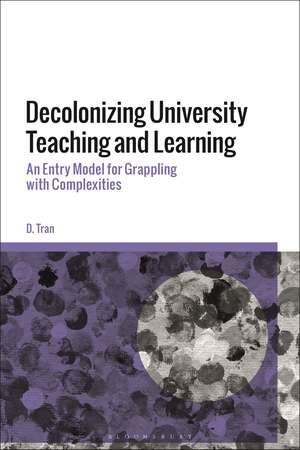Decolonizing University Teaching and Learning: An Entry Model for Grappling with Complexities
Autor D. Tranen Limba Engleză Paperback – 28 dec 2022
| Toate formatele și edițiile | Preț | Express |
|---|---|---|
| Paperback (1) | 191.13 lei 6-8 săpt. | +70.70 lei 7-13 zile |
| Bloomsbury Publishing – 28 dec 2022 | 191.13 lei 6-8 săpt. | +70.70 lei 7-13 zile |
| Hardback (1) | 598.02 lei 6-8 săpt. | |
| Bloomsbury Publishing – 16 iun 2021 | 598.02 lei 6-8 săpt. |
Preț: 191.13 lei
Preț vechi: 249.26 lei
-23% Nou
Puncte Express: 287
Preț estimativ în valută:
36.58€ • 37.96$ • 30.57£
36.58€ • 37.96$ • 30.57£
Carte tipărită la comandă
Livrare economică 15-29 martie
Livrare express 08-14 februarie pentru 80.69 lei
Preluare comenzi: 021 569.72.76
Specificații
ISBN-13: 9781350216761
ISBN-10: 1350216763
Pagini: 232
Ilustrații: 10 bw illus
Dimensiuni: 156 x 234 x 25 mm
Greutate: 0.33 kg
Editura: Bloomsbury Publishing
Colecția Bloomsbury Academic
Locul publicării:London, United Kingdom
ISBN-10: 1350216763
Pagini: 232
Ilustrații: 10 bw illus
Dimensiuni: 156 x 234 x 25 mm
Greutate: 0.33 kg
Editura: Bloomsbury Publishing
Colecția Bloomsbury Academic
Locul publicării:London, United Kingdom
Caracteristici
Provides examples of practical strategies which can be implemented across courses/programs to help increase levels of equality, participation, accessibility, and a sense of belonging, to form a more inclusive decolonized curricula
Notă biografică
D. Tran is Director of Education and Reader in Developmentally Disruptive Practices and Pedagogies at the University of the Arts London (UAL), UK. She previously held the role of Interim Dean of Learning, Teaching, Enhancement, and Associate Dean of Academic Enhancement at UAL, UK. Prior to this, Tran was Associate Professor of Higher Education Learning and Teaching at the University of Greenwich, UK. Tran is a Principal Fellow (AdvanceHE) and has worked at various UK HE institutions across different roles and areas. Her research interests include decolonizing teaching and learning, belonging, and reflective practice.
Cuprins
List of FiguresNotes on ContributorsPrefaceAcknowledgements Introduction1. What does it mean to Decolonize Teaching and Learning?2. What is Good Development?, with contributions from Nelly Kibirige (London Southbank University, UK) and Bernadine Idowu-Onibokun (University of West London, UK)3. The TRAAC Model (Teaching approach, Relationship, Activity and Assessment, and Content) 4. Bringing Together Materials for a Decolonized Curriculum, with contributions from Jason Arday (Durham University, UK) and Joanne Dunham (University of Leicester, UK)5. Moving Away From Passive Inclusivity6. Staff and Student Perceptions, with contributions from Ryan Carty (De Montfort University, UK), Rahma Elmahdi (Imperial College London, UK), and Emilie Fairnington (De Montfort University, UK)7. Delivery and Power Dynamics8. Implementing the TRAAC Model across Disciplines, with contributions from Paul Breen (University of Westminster, UK), Anthony Cullen (Middlesex University, UK), Rahma Elmahdi (Imperial College London, UK), Peter Jones (University of Greenwich, UK), Savvas Michael (University of Law, UK), and Dawn Reilly (University of Greenwich, UK)Conclusion ReferencesIndex
Recenzii
[Tran] shows readers what the benefits of decolonizing university teaching and learning are for students, faculty, and institutions as a whole. Bringing together contributions from a wide variety of scholars - from a range of disciplines including sports science and law - she provides the TRAAC model for teachers and practitioners to reflect upon classroom experiences and the student experience more broadly. PGCHE students, university teachers, and university communities at large would benefit from reading, and using, this book.
This volume approaches the challenging but important issues of decolonizing higher education with a refreshing trans-disciplinarity. The book's commitment to offering robust practical ideas makes it necessary reading not only for students and scholars but also for anyone involved in higher education administration, management and policy-making.
This volume approaches the challenging but important issues of decolonizing higher education with a refreshing trans-disciplinarity. The book's commitment to offering robust practical ideas makes it necessary reading not only for students and scholars but also for anyone involved in higher education administration, management and policy-making.
